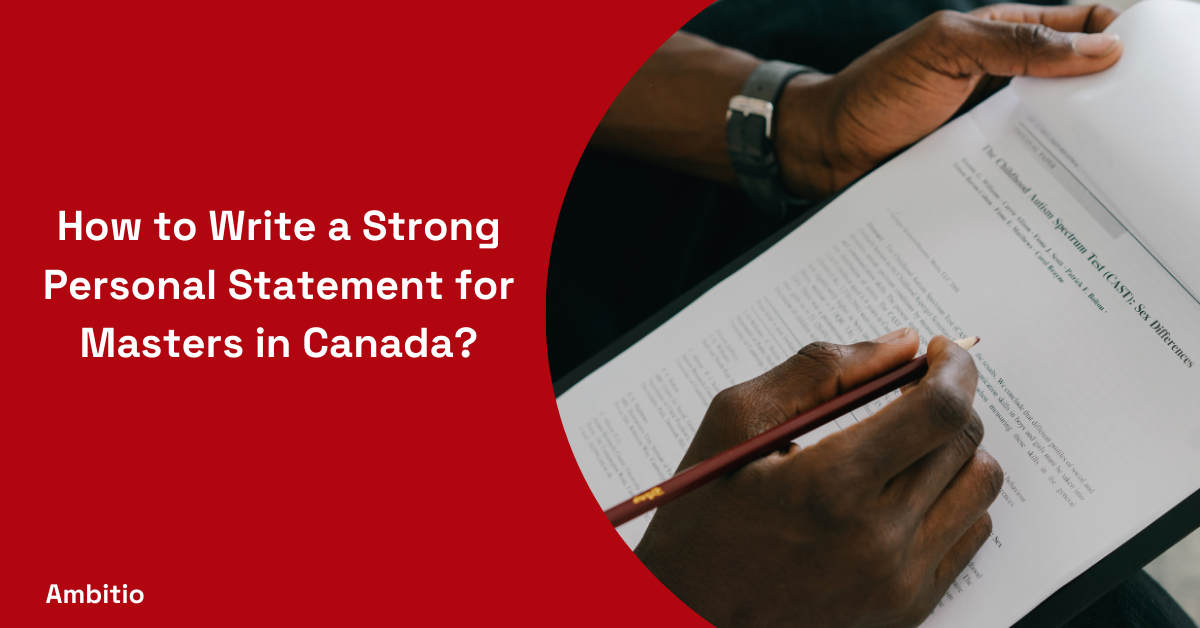11 April 2025
5 minutes read
How to Write a Strong Personal Statement for Masters in Canada?

Key Takeaways:
- A well-crafted personal statement for masters in Canada is crucial to highlight your passion, academic background, and career goals.
- Tailor your personal statement to each university’s unique program and faculty to show you’re a good fit for their offerings.
- Proofreading for clarity and error-free writing can significantly boost your chances of impressing the admissions committee.
Applying for a master’s program in Canada is highly competitive, with thousands of international students vying for a spot. A well-crafted personal statement can be the difference between acceptance and rejection, as admissions officers carefully evaluate your motivation, academic background, and fit for the program. However, many applicants struggle with this task, often underestimating the importance of tailoring their statement to the specific requirements of the university and program.
Writing a personal statement for masters in Canada requires more than just listing achievements, it’s about showcasing your passion, goals, and suitability for the program. By focusing on your personal experiences, academic goals, and how the program aligns with your future ambitions, you can create a compelling statement that leaves a lasting impression. Remember, proofreading for spelling and grammar errors and editing for clarity can make a significant difference in shaping your application.
Understanding the Purpose of Your Personal Statement
Your personal statement for masters in Canada is a key document that allows you to explain why you’re a strong candidate for the program. It provides the admission committee with insight into your academic background, your interest in the degree, and how it aligns with your career goals. This is your chance to demonstrate your passion for the field and show why you are a good fit for the institution.

Writing personal statements isn’t just about listing achievements, it’s about crafting an engaging essay that highlights your skills, motivation, and how the program will help you achieve your goals. A well-structured personal statement, free of errors, can significantly impress the committee and help your application stand out from the rest.
Key Elements to Include in Your Personal Statement for Graduate School
A strong personal statement for masters in Canada plays a pivotal role in the graduate school application process. It is your opportunity to convey your passion, motivation, and readiness for graduate studies. The statement serves as a foundation for the admissions committee to understand why you’re a good fit for the program and how your education aligns with the faculty’s focus. To craft a compelling personal statement, it’s crucial to follow the right format and include relevant details that highlight your academic journey, professional experiences, and future aspirations.
Here are the key elements to include:
- Clear Introduction: Explain your interest in the program and what inspired you to apply.
- Academic Background: Mention your undergraduate education, relevant coursework, and any specializations.
- Professional Experience: Highlight achievements and work that support your application materials, like your resume.
- Career Goals: Convince the committee how the program will help you achieve your career ambitions and why it’s the right fit for you.
- Conclusion: Summarize why you’re a strong candidate and how the program aligns with your goals.
Always ensure your statement is error-free by reviewing it multiple times before submission.
How to Tailor Your Personal Statement to Canadian Universities
Tailoring your personal statement for masters in Canada to specific universities is crucial in making your application stand out. Each university and program has its unique values, focus areas, and faculty expertise.

By aligning your statement of purpose with the program’s specific requirements, you can show the admissions committee that you are genuinely interested in their institution and are a good fit. Here’s how to tailor your personal statement effectively:
- Research the Program: Understand what the university specializes in and how it aligns with your goals. Mention faculty members whose work inspired you.
- Customize Your Statement: Make your personal statement relevant to the program. Address why you want to study in Canada and how it will help you achieve your goals.
- Highlight Your Fit: Use the template to craft a strong statement that conveys how your academic background and career plans align with the program’s focus.
- Be Specific About Your Intent: Explain how you intend to specialize in a particular area and why this program is the best place to achieve your graduation goals.
- Avoid Generic Letters: Instead of using a generic cover letter, write a personalized statement that shows you understand the application documents and the program’s expectations.
Always review your personal statement, ensuring it’s a compelling, error-free document before you submit it.
Final Tips for Writing a Personal Statement for Masters in Canada
Writing a personal statement for masters in Canada is an opportunity to showcase who you are beyond your grades and test scores. It’s your chance to demonstrate your passion, achievements, and goals, and how they align with the program you are applying to. To make the most of this opportunity, follow these final tips on writing a compelling personal statement.
- Be Authentic: Your personal statement is your story, so make it personal. Be genuine and let your passion for the field come through.
- Focus on Fit: Clearly explain why you want to study at that specific university and how it aligns with your long-term career goals.
- Structure and Clarity: Maintain a clear and logical format, making it easy for the admissions committee to follow your thoughts.
- Proofread and Edit: Review your personal statement multiple times to ensure it is error-free and professionally written.
- Use Specific Examples: Provide relevant examples from your undergraduate education, internships, or any other experiences that highlight your skills and passion.
By implementing these tips, you can craft a strong, engaging personal statement that enhances your chances of securing admission to your desired graduate program in Canada.
10 Top Universities to Study Masters in Canada
Canada is one of the most popular destinations for international students, especially for pursuing a Master’s degree. With its world-class universities, diverse cultural environment, and post-graduation work opportunities, studying in Canada offers a great balance of academic excellence and practical experience. According to recent data, Canada ranks as one of the top countries in the world for higher education, attracting thousands of international students each year.
Here are the top 10 universities in Canada for Master’s programs, along with their average tuition fees, average salary post-graduation, and the exams required for admission:
| University | Average Tuition Fees | Average Salary (Post-Graduation) | Exams Required |
|---|---|---|---|
| University of Toronto | CAD 20,000 – CAD 50,000 | CAD 60,000 – CAD 80,000 | GRE, TOEFL/IELTS |
| University of British Columbia | CAD 18,000 – CAD 45,000 | CAD 55,000 – CAD 75,000 | GRE, TOEFL/IELTS |
| McGill University | CAD 18,000 – CAD 40,000 | CAD 55,000 – CAD 70,000 | GRE, TOEFL/IELTS |
| University of Waterloo | CAD 12,000 – CAD 30,000 | CAD 60,000 – CAD 80,000 | GRE, TOEFL/IELTS |
| Western University | CAD 14,000 – CAD 35,000 | CAD 55,000 – CAD 70,000 | GRE, TOEFL/IELTS |
| University of Alberta | CAD 12,000 – CAD 30,000 | CAD 55,000 – CAD 65,000 | GRE, TOEFL/IELTS |
| Queen’s University | CAD 15,000 – CAD 35,000 | CAD 50,000 – CAD 70,000 | GRE, TOEFL/IELTS |
| University of Ottawa | CAD 10,000 – CAD 30,000 | CAD 50,000 – CAD 70,000 | GRE, TOEFL/IELTS |
| University of Montreal | CAD 10,000 – CAD 20,000 | CAD 50,000 – CAD 60,000 | GRE, TOEFL/IELTS |
| Simon Fraser University | CAD 12,000 – CAD 30,000 | CAD 55,000 – CAD 65,000 | GRE, TOEFL/IELTS |
Conclusion
A strong personal statement for masters in Canada is essential to stand out in the competitive admissions process. It’s your opportunity to showcase your passion, academic background, and career goals, all while demonstrating why you’re a perfect fit for the program. By tailoring your statement to each university’s unique offerings, you increase your chances of acceptance.
Ready to craft a compelling personal statement? Let Ambitio help you every step of the way! Our expert guidance ensures your application materials shine, giving you the best chance at securing your spot in top Canadian universities. Get started today!
FAQs
What is a personal statement, and why is it important?
A personal statement highlights your motivations and experiences, helping admissions committees assess your suitability beyond grades.
What should I include in my personal statement?
Include your motivation, academic background, professional experiences, and career goals.
How long should my personal statement be?
Typically between 500 to 1,000 words, depending on the university’s guidelines.
How can I make my personal statement stand out?
Use specific examples and genuine experiences to illustrate your points.
Should I tailor my personal statement for each university?
Yes, tailor it to highlight why you’re interested in that specific program.
How should I structure my personal statement?
Use an introduction, body, and conclusion to organize your thoughts.
What are common mistakes to avoid?
Avoid generic statements, grammar errors, and not following instructions.

You can study at top universities worldwide!
Get expert tips and tricks to get into top universities with a free expert session.
Book Your Free 30-Minute Session Now! Book a call now




























